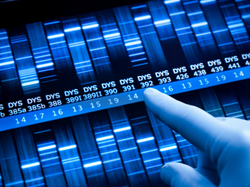
A newly identified set of genes may predict which women are at high risk for getting breast cancer that is sensitive to estrogen and, therefore, would be helped by taking drugs to prevent it, reports a new Northwestern Medicine® study.
“We now have the possibility of predicting if a preventive drug will work for a woman at high risk of breast cancer, so that we don’t expose women to the risks and side effects of this drug if it won’t help them,” said Seema Khan, MD, senior author of the study, which was published March 19, 2013, in the journal Cancer Prevention Research.
Khan is co-leader of the breast cancer program at the Robert H. Lurie Comprehensive Cancer Center of Northwestern University. She also is the Bluhm Family Professor of Cancer Research at Northwestern University Feinberg School of Medicine and a physician at Northwestern Memorial Hospital.
Drugs such as tamoxifen and raloxifene are available to prevent breast cancer in women who are at high risk based on having a close relative with breast cancer, or certain types of benign change in the breast identified on biopsy – but the drugs are only effective against breast cancer that is sensitive to estrogen, known as hormone receptor-positive breast cancer. They fail to prevent breast cancer that is not sensitive to estrogen, called hormone receptor-negative breast cancer. Young women and African American women are at highest risk for this type of cancer.
Until now, it has not been possible to predict which of these two major types of breast cancer will occur in a particular high-risk woman. Since the breast cancer prevention drugs also have side effects, many women have chosen not to take the drugs. The newly discovered genes, many of which are involved in fat metabolism, were present at a higher level in the healthy breasts of women with hormone receptor-negative breast cancer. The discovery potentially would allow women to make an informed decision based on better information about the type of breast cancer for which they are at risk. The genes also provide potential targets to develop preventive therapy for hormone receptor-negative breast cancer.
“Identifying these genes also gives us a target for new therapies,” Khan said. “Once we understand what regulates these genes, we can try to develop a therapy to switch them off.”
“It was a surprise for us that these genes are related to fat metabolism, because we would have expected them to be related to estrogen,” said Jun Wang, PhD, a research assistant professor of surgery at Feinberg and first author on the study. “Now we want to find out why women have higher levels of these genes.”
Khan and colleagues wanted to find a way to identify women at risk for estrogen-sensitive breast cancer by examining the gene expression in the other, healthy breasts of women who had a primary breast cancer. Previous research has shown that if women who have cancer in one breast develop it in the second breast, the second cancer is likely to have the same hormone receptor status as the first.
They analyzed the genes in the unaffected breasts of 30 women; 15 with estrogen receptor-positive breast cancer and 15 with estrogen receptor-negative breast cancer. They validated their results in a second group of women with both types of breast cancer (12 positive and 12 negative) and a control group of 12 women who did not have cancer. One-third of the women in the study were premenopausal and two-thirds were postmenopausal.
They identified 13 genes with significantly higher expression levels in samples from women with estrogen receptor-negative breast cancer. Eight of these genes were associated with lipid or fat metabolism, and several are known to be abnormally expressed in breast cancer cells, adding strength to the findings.
The research was supported in part by the Lynn Sage Cancer Research Foundation and the Avon Foundation.






